我与外教十句外企常用英语
一百句与老外交流最常用的句子中英文对照
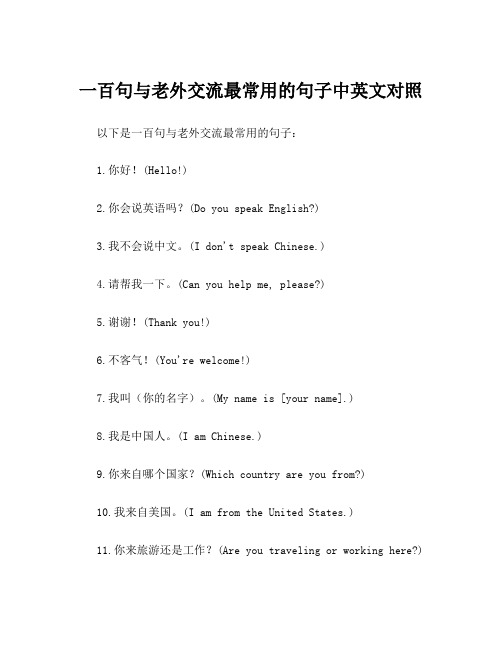
一百句与老外交流最常用的句子中英文对照以下是一百句与老外交流最常用的句子:1.你好!(Hello!)2.你会说英语吗?(Do you speak English?)3.我不会说中文。
(I don't speak Chinese.)4.请帮我一下。
(Can you help me, please?)5.谢谢!(Thank you!)6.不客气!(You're welcome!)7.我叫(你的名字)。
(My name is [your name].)8.我是中国人。
(I am Chinese.)9.你来自哪个国家?(Which country are you from?)10.我来自美国。
(I am from the United States.)11.你来旅游还是工作?(Are you traveling or working here?)12.我在这里工作。
(I am working here.)13.你喜欢中国的文化吗?(Do you like Chinese culture?)14.是的,我很喜欢。
(Yes, I really like it.)15.请问,这附近有好的餐厅吗?(Excuse me, are there any good restaurants nearby?)16.你有什么推荐?(Do you have any recommendations?)17.这里有什么好玩的地方?(What are some fun places to visit here?)18.我可以去哪里购物?(Where can I go shopping?)19.请告诉我怎么去(地点)。
(Please tell me how to get to [location].)20.麻烦给我一个地图。
(Could you give me a map, please?)21.我迷路了。
(I'm lost.)22.对不起,我听不懂。
外企人员实用日常英语会话
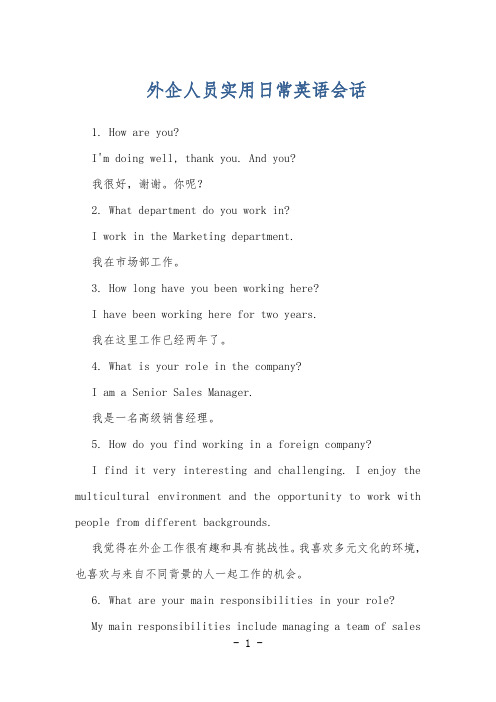
外企人员实用日常英语会话1. How are you?I'm doing well, thank you. And you?我很好,谢谢。
你呢?2. What department do you work in?I work in the Marketing department.我在市场部工作。
3. How long have you been working here?I have been working here for two years.我在这里工作已经两年了。
4. What is your role in the company?I am a Senior Sales Manager.我是一名高级销售经理。
5. How do you find working in a foreign company?I find it very interesting and challenging. I enjoy the multicultural environment and the opportunity to work with people from different backgrounds.我觉得在外企工作很有趣和具有挑战性。
我喜欢多元文化的环境,也喜欢与来自不同背景的人一起工作的机会。
6. What are your main responsibilities in your role?My main responsibilities include managing a team of salesrepresentatives, developing sales strategies, and achieving sales targets.我的主要职责包括管理销售代表团队,制定销售策略,以及实现销售目标。
7. How do you communicate with your team members?I communicate with my team members through regular team meetings, emails, and one-on-one discussions. We also use project management tools to collaborate and stay updated on our progress.我通过定期的团队会议、电子邮件和一对一的讨论与团队成员沟通。
跟老外生意的日常用语
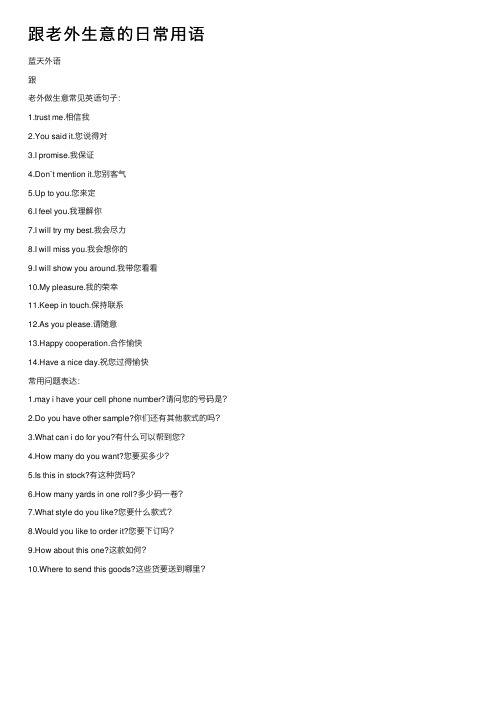
跟⽼外⽣意的⽇常⽤语
蓝天外语
跟
⽼外做⽣意常见英语句⼦:
1.trust me.相信我
2.You said it.您说得对
3.I promise.我保证
4.Don`t mention it.您别客⽓
5.Up to you.您来定
6.I feel you.我理解你
7.I will try my best.我会尽⼒
8.I will miss you.我会想你的
9.I will show you around.我带您看看
10.My pleasure.我的荣幸
11.Keep in touch.保持联系
12.As you please.请随意
13.Happy cooperation.合作愉快
14.Have a nice day.祝您过得愉快
常⽤问题表达:
1.may i have your cell phone number?请问您的号码是?
2.Do you have other sample?你们还有其他款式的吗?
3.What can i do for you?有什么可以帮到您?
4.How many do you want?您要买多少?
5.Is this in stock?有这种货吗?
6.How many yards in one roll?多少码⼀卷?
7.What style do you like?您要什么款式?
8.Would you like to order it?您要下订吗?
9.How about this one?这款如何?
10.Where to send this goods?这些货要送到哪⾥?。
私人外教一对一,在外企混必用的口语
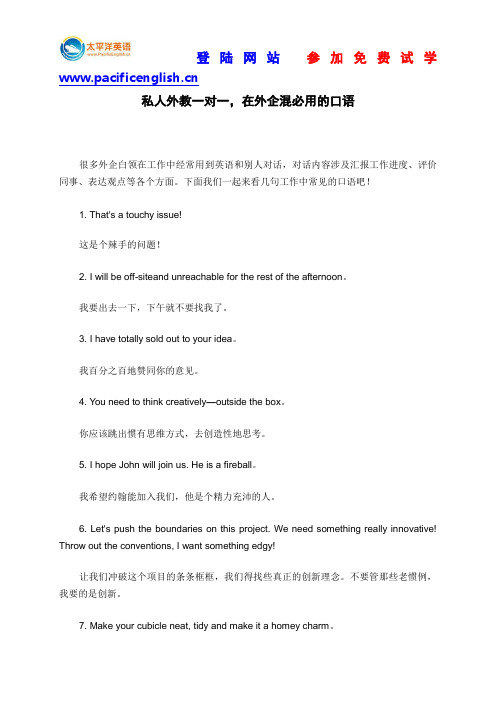
私人外教一对一,在外企混必用的口语很多外企白领在工作中经常用到英语和别人对话,对话内容涉及汇报工作进度、评价同事、表达观点等各个方面。
下面我们一起来看几句工作中常见的口语吧!1. That's a touchy issue!这是个辣手的问题!2. I will be off-siteand unreachable for the rest of the afternoon。
我要出去一下,下午就不要找我了。
3. I have totally sold out to your idea。
我百分之百地赞同你的意见。
4. Y ou need to think creatively—outside the box。
你应该跳出惯有思维方式,去创造性地思考。
5. I hope John will join us. He is a fireball。
我希望约翰能加入我们,他是个精力充沛的人。
6. Let's push the boundaries on this project. We need something really innovative! Throw out the conventions, I want something edgy!让我们冲破这个项目的条条框框,我们得找些真正的创新理念。
不要管那些老惯例,我要的是创新。
7. Make your cubicle neat, tidy and make it a homey charm。
把你的办公桌弄得干净整洁,像家一样温馨。
8. My boss went nuclear onme today。
今天我的老板对我大吼大叫。
9. His proposal doesn't sit well with manager of the department。
他的议案不太合部门经理的意。
10. Her creative idea won her a lot of oohs and aahsfrom her co-workers。
外企实用英文句子与会话
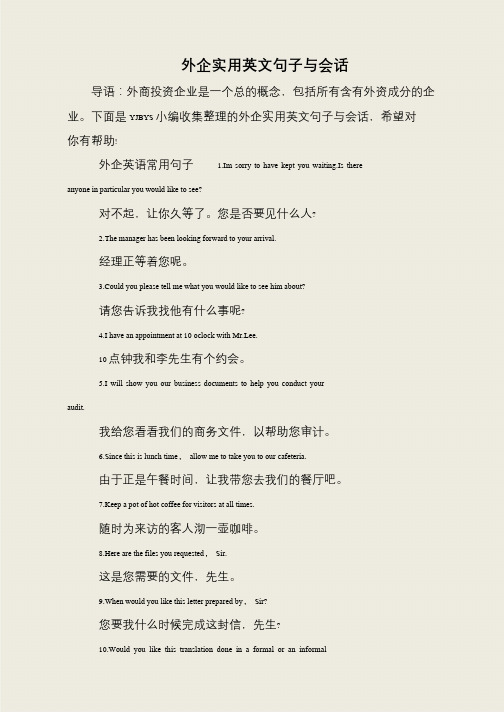
外企实用英文句子与会话导语:外商投资企业是一个总的概念,包括所有含有外资成分的企业。
下面是YJBYS 小编收集整理的外企实用英文句子与会话,希望对你有帮助!外企英语常用句子 1.Im sorry to have kept you waiting.Is there anyone in particular you would like to see?对不起,让你久等了。
您是否要见什么人?2.The manager has been looking forward to your arrival.经理正等着您呢。
3.Could you please tell me what you would like to see him about?请您告诉我找他有什么事呢?4.I have an appointment at 10 oclock with Mr.Lee.10 点钟我和李先生有个约会。
5.I will show you our business documents to help you conduct your audit.我给您看看我们的商务文件,以帮助您审计。
6.Since this is lunch time,allow me to take you to our cafeteria.由于正是午餐时间,让我带您去我们的餐厅吧。
7.Keep a pot of hot coffee for visitors at all times.随时为来访的客人沏一壶咖啡。
8.Here are the files you requested,Sir.这是您需要的文件,先生。
9.When would you like this letter prepared by,Sir?您要我什么时候完成这封信,先生?10.Would you like this translation done in a formal or an informal。
和老外沟通最基本的100句常用英语
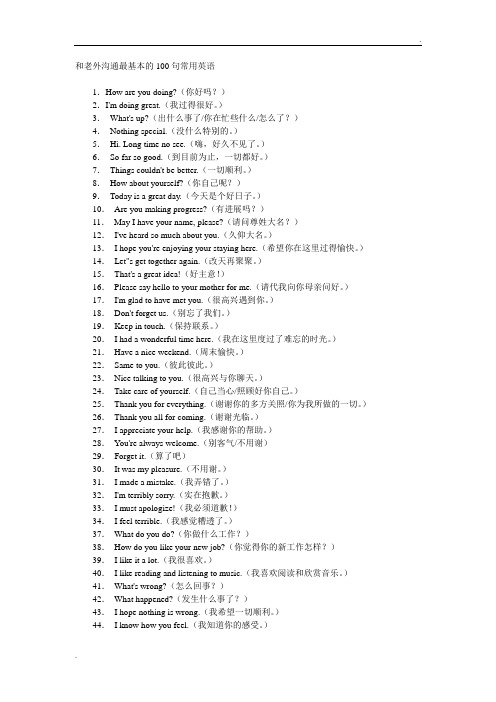
和老外沟通最基本的100句常用英语1.How are you doing?(你好吗?)2.I'm doing great.(我过得很好。
)3.What's up?(出什么事了/你在忙些什么/怎么了?)4.Nothing special.(没什么特别的。
)5.Hi. Long time no see.(嗨,好久不见了。
)6.So far so good.(到目前为止,一切都好。
)7.Things couldn't be better.(一切顺利。
)8.How about yourself?(你自己呢?)9.Today is a great day.(今天是个好日子。
)10.Are you making progress?(有进展吗?)11.May I have your name, please?(请问尊姓大名?)12.I've heard so much about you.(久仰大名。
)13.I hope you're enjoying your staying here.(希望你在这里过得愉快。
)14.Let"s get together again.(改天再聚聚。
)15.That's a great idea!(好主意!)16.Please say hello to your mother for me.(请代我向你母亲问好。
)17.I'm glad to have met you.(很高兴遇到你。
)18.Don't forget us.(别忘了我们。
)19.Keep in touch.(保持联系。
)20.I had a wonderful time here.(我在这里度过了难忘的时光。
)21.Have a nice weekend.(周末愉快。
)22.Same to you.(彼此彼此。
)23.Nice talking to you.(很高兴与你聊天。
外企常用英语口语句型
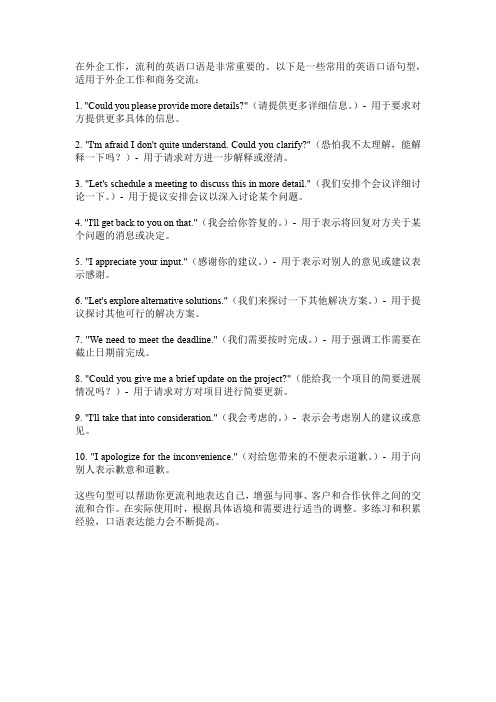
在外企工作,流利的英语口语是非常重要的。
以下是一些常用的英语口语句型,适用于外企工作和商务交流:1. "Could you please provide more details?"(请提供更多详细信息。
)- 用于要求对方提供更多具体的信息。
2. "I'm afraid I don't quite understand. Could you clarify?"(恐怕我不太理解,能解释一下吗?)- 用于请求对方进一步解释或澄清。
3. "Let's schedule a meeting to discuss this in more detail."(我们安排个会议详细讨论一下。
)- 用于提议安排会议以深入讨论某个问题。
4. "I'll get back to you on that."(我会给你答复的。
)- 用于表示将回复对方关于某个问题的消息或决定。
5. "I appreciate your input."(感谢你的建议。
)- 用于表示对别人的意见或建议表示感谢。
6. "Let's explore alternative solutions."(我们来探讨一下其他解决方案。
)- 用于提议探讨其他可行的解决方案。
7. "We need to meet the deadline."(我们需要按时完成。
)- 用于强调工作需要在截止日期前完成。
8. "Could you give me a brief update on the project?"(能给我一个项目的简要进展情况吗?)- 用于请求对方对项目进行简要更新。
9. "I'll take that into consideration."(我会考虑的。
外企常用商务用语英语
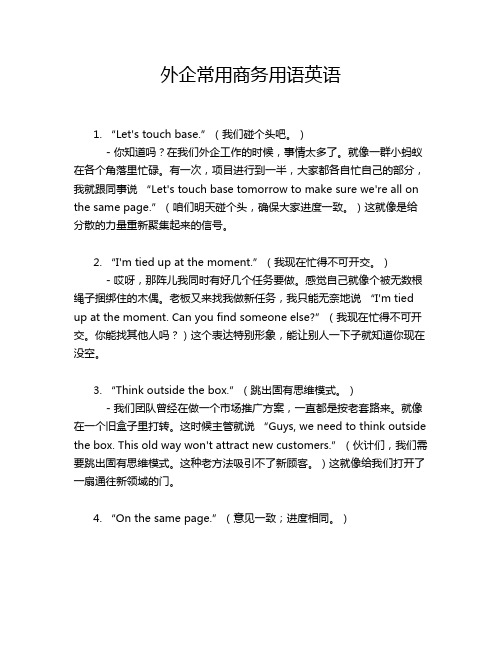
外企常用商务用语英语1. “Let's touch base.”(我们碰个头吧。
)- 你知道吗?在我们外企工作的时候,事情太多了。
就像一群小蚂蚁在各个角落里忙碌。
有一次,项目进行到一半,大家都各自忙自己的部分,我就跟同事说“Let's touch base tomorrow to make sure we're all on the same page.”(咱们明天碰个头,确保大家进度一致。
)这就像是给分散的力量重新聚集起来的信号。
2. “I'm tied up at the moment.”(我现在忙得不可开交。
)- 哎呀,那阵儿我同时有好几个任务要做。
感觉自己就像个被无数根绳子捆绑住的木偶。
老板又来找我做新任务,我只能无奈地说“I'm tied up at the moment. Can you find someone else?”(我现在忙得不可开交。
你能找其他人吗?)这个表达特别形象,能让别人一下子就知道你现在没空。
3. “Think outside the box.”(跳出固有思维模式。
)- 我们团队曾经在做一个市场推广方案,一直都是按老套路来。
就像在一个旧盒子里打转。
这时候主管就说“Guys, we need to think outside the box. This old way won't attract new customers.”(伙计们,我们需要跳出固有思维模式。
这种老方法吸引不了新顾客。
)这就像给我们打开了一扇通往新领域的门。
4. “On the same page.”(意见一致;进度相同。
)- 在会议上,我们经常要确保大家都是“On the same page”。
有一次,我们在讨论新的产品设计。
设计师有一个很前卫的想法,但是工程部门担心技术实现不了。
大家讨论来讨论去,最后达成一致,我就说“Great, now we're all on the same page. Let's move forward.”(太好了,现在我们意见一致了。
外企日常英语口语交流1000个最常用
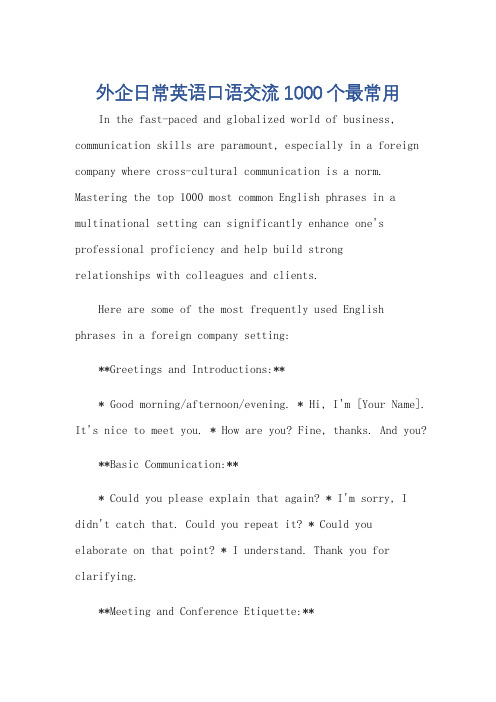
外企日常英语口语交流1000个最常用In the fast-paced and globalized world of business, communication skills are paramount, especially in a foreign company where cross-cultural communication is a norm. Mastering the top 1000 most common English phrases in a multinational setting can significantly enhance one's professional proficiency and help build strongrelationships with colleagues and clients.Here are some of the most frequently used English phrases in a foreign company setting:**Greetings and Introductions:*** Good morning/afternoon/evening. * Hi, I'm [Your Name]. It's nice to meet you. * How are you? Fine, thanks. And you? **Basic Communication:*** Could you please explain that again? * I'm sorry, I didn't catch that. Could you repeat it? * Could you elaborate on that point? * I understand. Thank you for clarifying.**Meeting and Conference Etiquette:*** Good day, everyone. Let's get started. * Could we please have a moment of silence for [reason]? * Thank you for your presentation. It was very informative. * Do you have any questions or concerns?**Discussing Projects and Tasks:*** What's the status of the project? * We need to meet our deadline by [date]. Can we do it? * There's an issue with [specific task]. Can we discuss it? * Let's brainstorm some ideas for this problem.**Dealing with Challenges and Conflicts:*** I have a concern about [issue]. Can we discuss it? * I think we need to reevaluate our approach to [problem]. * Could you please provide feedback on my performance? * I apologize for any inconvenience caused.**Closing a Meeting or Interaction:*** Thank you for your time and input. * Let's wrap this up for now and continue our discussion later. * It was a pleasure working with you. * Stay connected for further updates.Mastering these phrases not only helps in effective communication but also builds trust and respect among colleagues, leading to a more collaborative and productive work environment. Additionally, it enables individuals to navigate different cultures and work styles, essentialskills in a globalized business setting.**外企日常英语口语交流1000个最常用**在快节奏且全球化的商业世界中,交流技能至关重要,特别是在外企中,跨文化交流已成为常态。
我与外教,十句外企常用英语
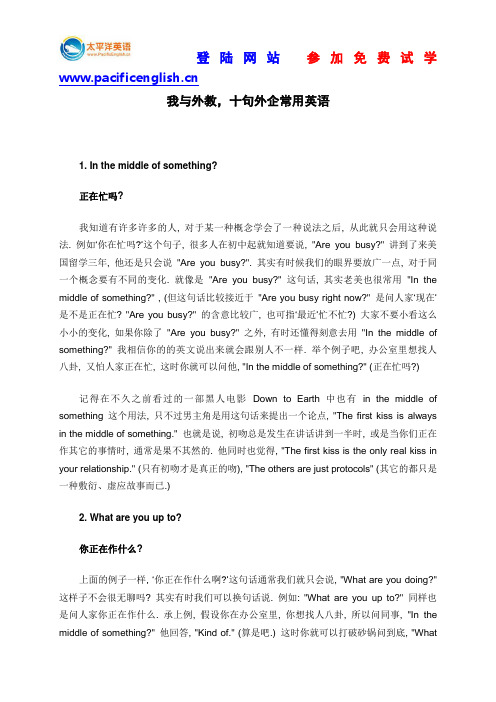
我与外教,十句外企常用英语1. In the middle of something?正在忙吗?我知道有许多许多的人, 对于某一种概念学会了一种说法之后, 从此就只会用这种说法. 例如‘你在忙吗?’这个句子, 很多人在初中起就知道要说, "Are you busy?" 讲到了来美国留学三年, 他还是只会说"Are you busy?". 其实有时候我们的眼界要放广一点, 对于同一个概念要有不同的变化. 就像是"Are you busy?" 这句话, 其实老美也很常用"In the middle of something?" , (但这句话比较接近于"Are you busy right now?" 是问人家‘现在’是不是正在忙? "Are you busy?" 的含意比较广, 也可指‘最近’忙不忙?) 大家不要小看这么小小的变化, 如果你除了"Are you busy?" 之外, 有时还懂得刻意去用"In the middle of something?" 我相信你的的英文说出来就会跟别人不一样. 举个例子吧, 办公室里想找人八卦, 又怕人家正在忙, 这时你就可以问他, "In the middle of something?" (正在忙吗?)记得在不久之前看过的一部黑人电影Down to Earth 中也有in the middle of something 这个用法, 只不过男主角是用这句话来提出一个论点, "The first kiss is always in the middle of something." 也就是说, 初吻总是发生在讲话讲到一半时, 或是当你们正在作其它的事情时, 通常是果不其然的. 他同时也觉得, "The first kiss is the only real kiss in your relationship." (只有初吻才是真正的吻), "The others are just protocols" (其它的都只是一种敷衍、虚应故事而已.)2. What are you up to?你正在作什么?上面的例子一样, ‘你正在作什么啊?’这句话通常我们就只会说, "What are you doing?" 这样子不会很无聊吗? 其实有时我们可以换句话说. 例如: "W hat are you up to?" 同样也是问人家你正在作什么. 承上例, 假设你在办公室里, 你想找人八卦, 所以问同事, "In the middle of something?" 他回答, "Kind of." (算是吧.) 这时你就可以打破砂锅问到底, "Whatare you up to?" (那你最近在忙什么啊?) 另外有时候老美见面时也会问"What are you up to?" 意思就是问你最近在作什么啊? 跟另一句问候语"What's up?" 意思上很接近. 但是你要听对方的语气喔! 有时候"What are you up to?" 指的虽然还是"What are you doing?" 但它却是‘你在搞什么鬼啊?’的意思喔! 例如当你看到别人在乱翻你的东西, 你就可以责问他, "Hey, what are you up to?" 也就是骂他‘你在搞什么鬼啊?’. 或是像电影Blow 里毒贩的老爸骂他的儿子, "I know what you are up to." (我知道你在干些什么勾当.) 以上这些例子里, "What are you up to?" 完全可以用"What are you doing?" 来取代, 只不过因为我们在说话时要力求变化, 所以要多学几种不同的讲法.其实"What are you up to?" 还有许多其它的意思, 在此不一一列举, 不过还有一个比较常用的解释是, ‘进展的如何了?’例如朋友告诉你他正在写一部武侠小说, (就像我的labmate 一样), 你就可以问他, "What are you up to?" (进展的如何了), 而他的回答可能是, "I am writing Chapter 3 now." 我现在正在写第三章呢.3. Can you just give me a ballpark figure?能不能给我一个大概的数字.Ballpark 指的是专供球类比赛的公园, 特别是指大型的棒球场. 例如亚特兰大勇士队(Atlanta Braves) 的主场, Turner Field 就是一个ballpark. 那什么是ballpark figure 呢? 通常在棒球比赛时不是都会报今天的观众人数, 例如是49,132 人吗? 这个数字49,132 就是ballpark figure, 但这只是一个大约的估计数字而已, 所以ballpark figure 的意思就是指大约的估计数字. 所以在公司里如果老板问会计, 上个月水电费总共多少钱? 之后再加上一句, "Just give me a ballpark figure." 意思就是我只要一个大略的数字就行了. 甚至有些老美懒到就只说ballpark, 所以老板也有可能会说, "I'll need a ballpark of the revenue last year." (我需要去年的营收的大约数字.) 你就要自己知道这个ballpark 是ballpark figure 的意思.其实很多像ballpark 这种有点俚语的讲法, 你去问美国人, 我保证他们百分之九十九点九都知道ballpark 的意思. 但是有很多外国人, 不管他们的英语再流利, 不管在美国住多久, 却还是常常会有听不懂的状况. 像小笨霖的指导教授是欧洲人, 但在美国也待超过十年了, 英语的流利自然是不在话下. 可是呢? 有一次我跟她说"I can only give you aballpark." 她却问我ballpark 是什么意思. 我讲这个小故事给各位听的原因, 就是告诉你们拿这种俚语去跟美国人交谈, 通常是没问题的, 但是如果去跟英语同样也很流利的老印, ABC, 或是在美国住了很久的外国人, 则不保证他们能听得懂.4. Bottom line: We have to turn into profit by 2002.最重要的是: 我们必须在2002 年前转亏为盈.大家看过财务报表没? 上面是一大堆密密麻麻的数字, 告诉你公司的资产有多少, 折旧多少, 应收帐款多少. 但是这些都不是最重要的, 最重要的在最最下面那一行(bottom line), 叫净赚(Net earnings) 告诉你这家公司总共加起来到底是赚钱还是赔钱, (这其实才是最重要的, 不是吗?) 所以bottom line 这个字后来就变成了有‘最重要的是...’的意思. 例如商场上有句名言, "In business, If you don't take care of your customers, somebody else will. And that is the bottom line." (如果你不关心你的顾客的话, 其它的人会, 这是最重要的原则. ) 另外bottom line 也有‘最后的底限’,‘不能再退让的原则’的意思. 例如老板可以告诫员工, "Bottom line: We have to ship this order by Friday." (我最后的底限是, 我们必须在星期五前运交这批货. )5. The new CFO was sent to bring the company out of the red.这位新的财务长被派来把公司从赤字中拯救出来.中国人喜欢红色, 所以股市大涨时盘面上都是红通通的一片. 不过欧美国家对红色的认知则大不相同, 红色就表示亏损, 赤字. 像之前提到的bottom line 如果是用红笔写的, 那就是表示公司整体上来说是赔钱的. 相反的如果是用黑笔写的, 则表示是赚钱的. 所以我们常可以听到in the red 或是in the black 这样的讲法, 其实就是指公司赚不赚钱. 当然啦, 我们也可以用最简单的讲法, lose money 和make money 或是形容词unprofitable 和profitable来表示赔钱或赚钱. 例如这家公司是赚钱的, 你可以说, "This company is in the black.", "The comapny is making money." 或是"The company is profitable." 都可以.讲到这个profitable 让我不得不提醒大家non-profit 这个字, 因为常常有人会搞错. Non-profit 这个字指的并不是说不赚钱的, 而是说‘非营利性质的’, 例如像消费者文教基金会我们就可以说他是一个non-profit organization, 非营利机构, 这种组织就不是以赚钱为目的. 但nonprofitable 的话则是指不赚钱的就等于unprofitable 或是non-profit-making.6. Shelly just called in sick.Shelly 刚打电话来请病假.Call in sick 是一个在办公室内常会用到的片语, 指的是有人打电话来说他生病了不能来上班. 有兴趣听老美讲这句话的人不妨去看"What Women Want?" (男人百分百) 这部电影, 我记得他们就有用"call in sick" 这个片语. 当然啦, 这种事想也知道一定有相当的比例是偷懒而不想来上班而已, 不然就是员工找借口集体罢工, 例如"Some workers called in sick to have a strike." (有些工人藉由集体打电话请病假来罢工.)那如果是正常的请病假(sick leave/ medical leave) 要怎么讲? 你可以说, "I need a sick leave for two days." (我需要请两天病假.) 或是如果是因为老婆要分娩了, 想要请事假(personal leave), 你可以说, "I'm asking for a three-day paid/unpaid personal leave for my wife's labor." (因为我老婆要生了, 我想要请三天假.) 至于这个假是扣不扣钱? (paid/unpaid)就看公司的政策而定了.7. I just heard that seven people are going be laid off next month.我刚听到公司下个月要裁七位员工.最近失业率不断上升, 我也就顺便来谈谈裁员的话题. 公司要裁员的讲法有许多种, 其中最常见的不外是layoff 这个字(如果分开来写: lay off 是动词, 但合起来写layoff 则是名词) . 例如, "Cisco issues a profit warning, plans layoffs." (思科发布盈余警讯, 计划裁员.)当然还可以用比较口语的讲法说, cut jobs 或是slash jobs, 例如上一句我们也可以说, "Cisco plans to cut/slash jobs." (思科计划裁员.) 据路边马路消息说, 由于layoff 最近在英语中的出现频率排名大幅成长, layoff 这个字将会被收录在最新的英文常用3000 字汇当中. ^__^要是真的不幸在美国被裁员了怎么办? 先记住两句话再说, 第一句是, "Whose decision was this?" (这是谁的决定.) 俗语说冤有头债有主, 先问清楚了是谁动你的, 将来要把汽车轮胎放气才知道要放哪一台. 另一句话就是, "I am between jobs." 这句话在找新工作时很好用. 人家问你现在在作什么, 你不要呆呆地说, "I just got laid off." 多难听啊! 你应该说, "I am between jobs." 我正好在两个工作间的空档. 听起来比较委婉这可是之前刚被裁了员的好友Joseph 教我的, 他就因为很会讲这句"I am between jobs." 目前已经在德州休士顿找到新工作了. :D8. He suggested we should go to eat after my graveyard shift.他建议说我们可以在我的大夜班之后一起去吃东西.轮班这个字在英文里叫shift, 例如三班制就叫three shifts. 例如, "We have to work in three shifts to keep the company running." (我们必须轮三班制来保持工厂的运转.) 我想大家都知道三班制就是日夜, 小夜班和大夜班. 在英文里日班就是day shift 或是regular shift, 小夜班是night shift. 那大夜班呢? 有一个很有趣的讲法, 叫graveyard shift. 所以如果你要说明自己上的是大夜班, 就可以这样说, "I work on the graveyard shift."至于为什么叫graveyard shift 呢? 其中有一个广为流传的故事是这么说的, 在十九世纪时, 人们有时候会不小心把还活着的人当成死人埋掉. 为了避免这种悲剧发生, 所以他们在每个棺材里都装上电铃, 以便让这些意外醒来的‘尸体’能够按铃求救. 也因此必须另外安排一位仁兄晚上时在墓地(graveyard) 里巡查, 以便有人按铃时能即时通知家属. 所以大夜班后来就以此得名, 成为了graveyard shift. 至于你相不相信这种传说呢? 就看你自己了!9. I am only a regular 9-to-5er.我只是一个平凡的朝九晚五上班族.我相信中文的‘朝九晚五’这个字应该就是从英文9-to-5 这个字直接翻过来的吧? 由于上班族的工作时间多半都是很固定从早上九点到晚上五点, 所以才有9-to-5 这个用法, 指的就是很一般上下班的工作. 记得有一次跟一个在社会上己经工作多年又回来念研究所的老美聊到他回学校念书的动机, 他就告诉我, "I don't want to work 9 to 5 for the rest of my life." (我不想一辈子都作朝九晚五的工作.) 另外像这种上班族也可以自称是一个9-to-5er, 也就是指作这种朝九晚五工作的上班族. 但是像小笨霖我呢? 我就该自称是10-to-3er 了. (我当然没那么认真凌晨三点回家, 而是下午三点就回家睡午觉了!)10. I refuse to work overtime during the weekend.我拒绝在周末时加班.英文里加班叫work overtime. 例如别人喊你今晚出去吃饭, 你说, "Sorry, I have to work overtime." 就是告诉他, 很抱歉, 我今晚要加班. 不过有趣的是, 除了‘加班’可以叫overtime, 加班费也可以叫overtime. 例如你可以大声地告诉老板, "Y ou have to pay me overtime!" (你必须要付我加班费.) 不过现在时机不好, 我看还是小声讲就好了.除了这个pay overtime 之外, 老美也常用到另外两个字, 一个叫double time, 另一个叫time and one-half. Double time 指的是双倍的工资, 而time and one-half 或是time and a half 则是指一倍半的工资. 例如老板叫你作一些额外的工作, 你可以说, "If you pay me double time, I'll do it." (如果你付我双倍的工资, 我就去做.) 再造一句, "I like to work on holidays because I am on time and a half." (我喜欢在假日时工作, 因为这时的工资算一倍半.)The basket was heavy and the bundle was large, but she lugged them along like a person who did not find her especial burden in material things. Occasionally she stopped to rest in a mechanical way by some gate or post; and then, giving the baggage another hitch upon her full round arm, went steadily on again.It was a Sunday morning in late October, about four months after Tess Durbeyfield's arrival at Trantridge, and some few weeks subsequent to the night ride in The Chase. The time was not long past daybreak, and the yellow luminosity upon the horizon behind her back lighted the ridge towards which her face was set——the barrier of the vale wherein she had of late been a stranger——which she would have to climb over to reach her birthplace. The ascent was gradual on this side, and the soil and scenery differed much from those within Blackmore Vale. Even the character and accent of the two peoples had shades of difference,despite the amalgamating effects of a roundabout railway; so that, though less than twenty miles from the place of her sojourn at Trantridge, her native villagehad seemed a far-away spot. The field-folk shut in there traded northward and westward, travelled, courted, and married northward and westward, thought northward and westward; those on this side mainly directed their energies and attention to the east and south.The incline was the same down which d'Urberville had driven her so wildly on that day in June. Tess went up the remainder of its length without stopping,and on reaching the edge of the escarpment gazed over the familiar green world beyond, now half-veiled in mist. It was always beautiful from here; it was terribly beautiful to Tess today, for since her eyes last fell upon it she had learnt that the serpent hisses where the sweet birds sing, and her views of life had been totally changed for her by the lesson. Verily another girl than the simple one she had been at home was she who, bowed by thought, stood still here, and turned to look behind her. She could not bear to look forward into the Vale.Ascending by the long white road that Tess herself had just laboured up, she saw a two-wheeled vehicle, beside which walked a man, who held up his hand to attract her attention.She obeyed the signal to wait for him with unspeculative repose, and in a few minutes man and horse stopped beside her."Why did you slip away by stealth like this?" said d'Urberville, with upbraiding breathlessness; "on a Sunday morning, too, when people were all in bed! I only discovered it by accident, and I have been driving like the deuce to overtake you. Just look at the mare. Why go off like this? You know that nobody wished to hinder your going. And how unnecessary it has been for you to toil along on foot, and encumber yourself with this heavy load! I have followed like a madman, simply to drive you the rest of the distance, if you won't come back.""I shan't come back," said she."I thought you wouldn't——I said so! Well, then, put up your basket,and let me help you on."She listlessly placed her basket and bundle within the dog-cart, and stepped up, and they sat side by side. She had no fear of him now, and in the cause of her confidence her sorrow lay.D'Urberville mechanically lit a cigar, and the journey was continued with broken unemotional conversation on the commonplace objects by the wayside. He had quite forgotten his struggle to kiss her when, in the early summer,they had driven in the opposite direction along the same road. But she had not,and she sat now, like a puppet, replying to his remarks in monosyllables. After some miles they came in view of the clump of trees beyond which the village of Marlott stood. It was only then that her still face showed the least emotion,a tear or two beginning to trickle down.。
和老外做生意,记住10句地道口语
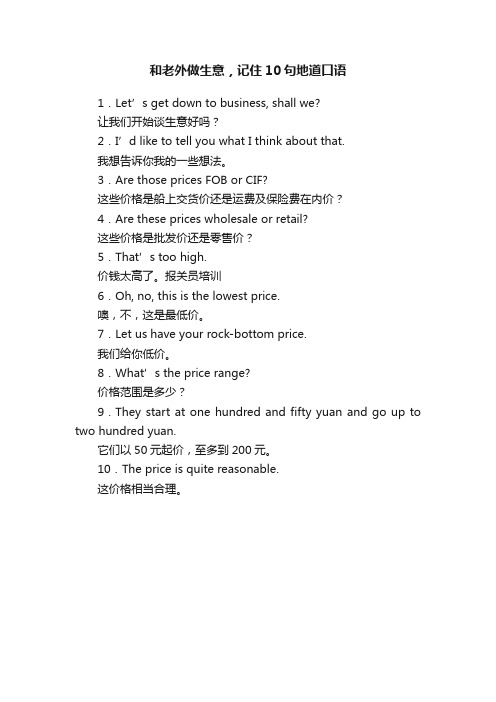
和老外做生意,记住10句地道口语
1.Let’s get down to business, shall we?
让我们开始谈生意好吗?
2.I’d like to tell you what I think about that.
我想告诉你我的一些想法。
3.Are those prices FOB or CIF?
这些价格是船上交货价还是运费及保险费在内价?
4.Are these prices wholesale or retail?
这些价格是批发价还是零售价?
5.That’s too high.
价钱太高了。
报关员培训
6.Oh, no, this is the lowest price.
噢,不,这是最低价。
7.Let us have your rock-bottom price.
我们给你低价。
8.What’s the price range?
价格范围是多少?
9.They start at one hundred and fifty yuan and go up to two hundred yuan.
它们以50元起价,至多到200元。
10.The price is quite reasonable.
这价格相当合理。
外企常用英语
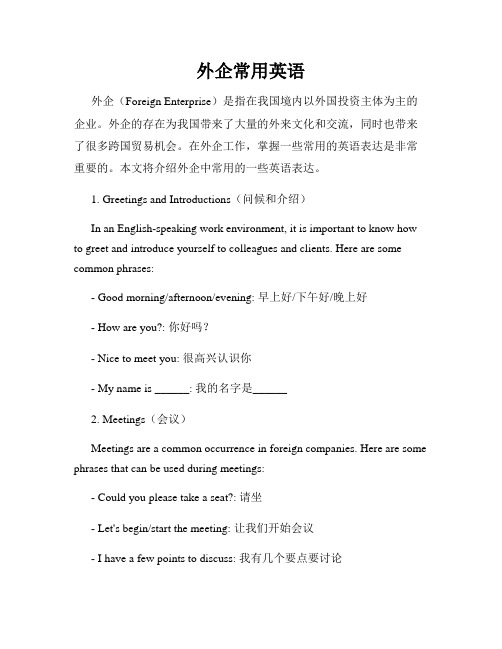
外企常用英语外企(Foreign Enterprise)是指在我国境内以外国投资主体为主的企业。
外企的存在为我国带来了大量的外来文化和交流,同时也带来了很多跨国贸易机会。
在外企工作,掌握一些常用的英语表达是非常重要的。
本文将介绍外企中常用的一些英语表达。
1. Greetings and Introductions(问候和介绍)In an English-speaking work environment, it is important to know how to greet and introduce yourself to colleagues and clients. Here are some common phrases:- Good morning/afternoon/evening: 早上好/下午好/晚上好- How are you?: 你好吗?- Nice to meet you: 很高兴认识你- My name is ______: 我的名字是______2. Meetings(会议)Meetings are a common occurrence in foreign companies. Here are some phrases that can be used during meetings:- Could you please take a seat?: 请坐- Let's begin/start the meeting: 让我们开始会议- I have a few points to discuss: 我有几个要点要讨论- Can you elaborate on that?: 你能详细说明一下吗?3. Presentations(演示)Presentations are often used to share information and ideas in a professional setting. Here are some phrases that can be helpful during presentations:- Today, I would like to talk about...: 今天,我想谈谈...- Let me start by giving you some background information: 让我先介绍一下背景信息- As you can see on the screen: 正如你们在屏幕上看到的- Do you have any questions so far?: 到目前为止,你们有什么问题吗?4. Email Correspondence(邮件往来)Email is a common form of communication in foreign companies. Here are some useful phrases for writing professional emails:- Dear Mr./Ms. ______: 亲爱的______先生/女士- I am writing to inquire about...: 我写信是想了解...- Thank you for your prompt reply: 感谢您的及时回复- Please find attached the document you requested: 请查收您需要的文件5. Networking(社交)Networking is an important aspect of working in a foreign company. Here are some phrases that can be used during social interactions:- What do you do for a living?: 你从事什么职业?- Are you attending the conference next week?: 你下周会参加这个会议吗?- It was nice talking to you: 很高兴和你交谈- Let's stay in touch: 让我们保持联系6. Apologies and Requests(道歉和请求)Sometimes, it may be necessary to apologize or make a request in a professional setting. Here are some phrases that can be used:- I apologize for the inconvenience caused: 对给您带来的不便表示道歉- Could you please send me the report by tomorrow?: 你能否在明天之前将报告发给我?- I would appreciate it if you could help me with this matter: 如果您能帮我处理这个事情,我将不胜感激- Thank you for your assistance: 感谢您的帮助总结:以上是外企常用的一些英语表达。
外企常用英语
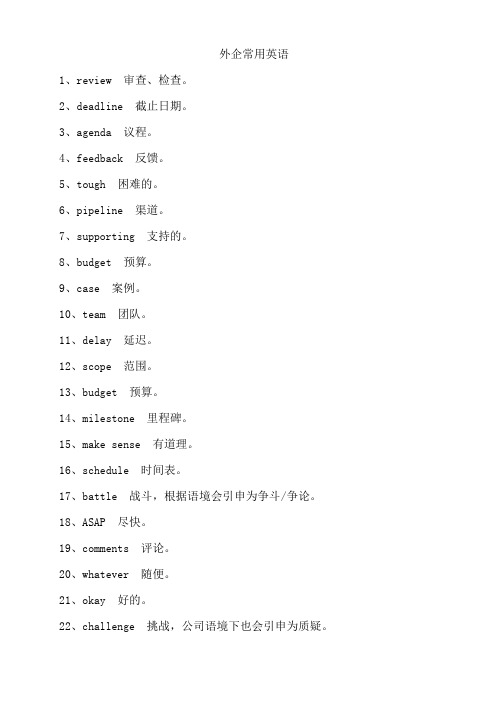
外企常用英语
1、review 审查、检查。
2、deadline 截止日期。
3、agenda 议程。
4、feedback 反馈。
5、tough 困难的。
6、pipeline 渠道。
7、supporting 支持的。
8、budget 预算。
9、case 案例。
10、team 团队。
11、delay 延迟。
12、scope 范围。
13、budget 预算。
14、milestone 里程碑。
15、make sense 有道理。
16、schedule 时间表。
17、battle 战斗,根据语境会引申为争斗/争论。
18、ASAP 尽快。
19、comments 评论。
20、whatever 随便。
21、okay 好的。
22、challenge 挑战,公司语境下也会引申为质疑。
23、anyway 无论如何。
24、focus 专注。
25、performance 表现。
26、point 观点。
27、keep somebody posted 就某件关注的市项,让人随时知悉进展。
28、brainstorm 开动脑力,激起头脑风暴。
29、compromise 公司里有人,就有政治,就有妥协。
30、challenge 跟老板叫板,challenge the boss。
31、teamwork 团队精神。
32、NG 不好,再来一次。
33、FNG 菜鸟,新员工。
超全整理外企常用英文
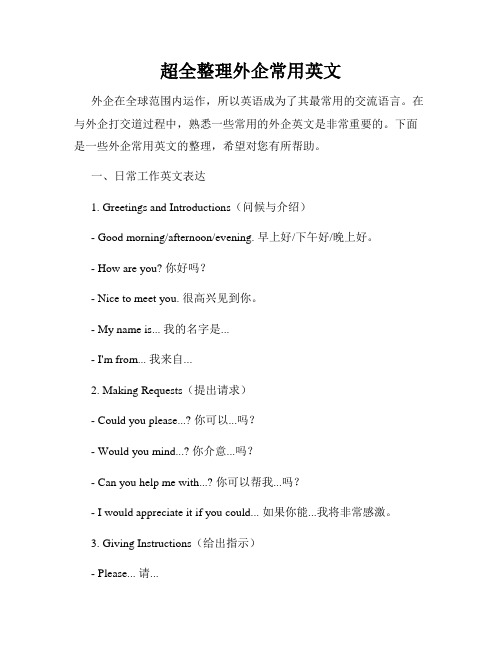
超全整理外企常用英文外企在全球范围内运作,所以英语成为了其最常用的交流语言。
在与外企打交道过程中,熟悉一些常用的外企英文是非常重要的。
下面是一些外企常用英文的整理,希望对您有所帮助。
一、日常工作英文表达1. Greetings and Introductions(问候与介绍)- Good morning/afternoon/evening. 早上好/下午好/晚上好。
- How are you? 你好吗?- Nice to meet you. 很高兴见到你。
- My name is... 我的名字是...- I'm from... 我来自...2. Making Requests(提出请求)- Could you please...? 你可以...吗?- Would you mind...? 你介意...吗?- Can you help me with...? 你可以帮我...吗?- I would appreciate it if you could... 如果你能...我将非常感激。
3. Giving Instructions(给出指示)- Please... 请...- Make sure to... 确保...- Remember to... 记住...- Don't forget to... 不要忘记...4. Meeting and Conference Calls(会议与电话会议)- I'd like to call this meeting to order. 我想召开这次会议。
- Let's move on to the next agenda item. 我们继续下一个议程。
- Can everyone hear me clearly? 大家都能听得清楚吗?- I'd like to invite [name] to present their report. 我想邀请[name]来介绍他们的报告。
外企英语面试常用短语
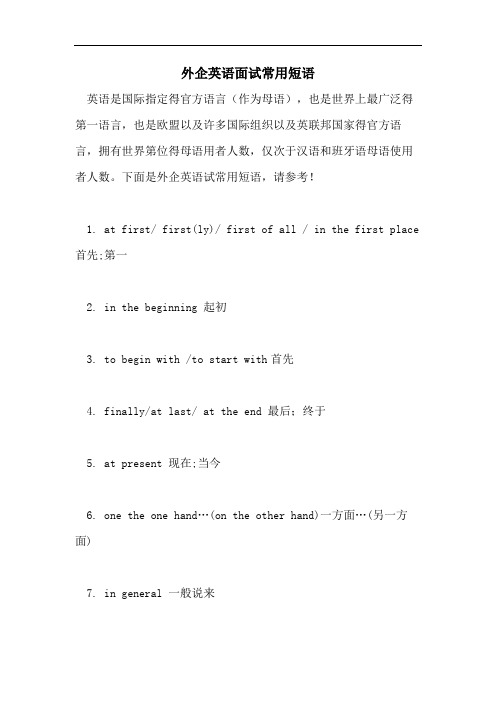
外企英语面试常用短语英语是国际指定得官方语言(作为母语),也是世界上最广泛得第一语言,也是欧盟以及许多国际组织以及英联邦国家得官方语言,拥有世界第位得母语用者人数,仅次于汉语和班牙语母语使用者人数。
下面是外企英语试常用短语,请参考!1. at first/ first(ly)/ first of all / in the first place 首先;第一2. in the beginning 起初3. to begin with /to start with首先4. finally/at last/ at the end 最后;终于5. at present 现在;当今6. one the one hand…(on the other hand)一方面…(另一方面)7. in general 一般说来8. generally speaking 一般地说9. on the whole /all in all总起来说10. in a word/ in short,/in brief, 简言之;总之11. to be honest 说实话12. all the time 一直,始终13. in my opinion. 在我看来14. as a matter of fact 实际上15. as far as ...be concerned 就...而言16. at least 至少17. by aident 偶然18. play an important role in…发挥着重要作用19. by all means 尽一切办法,务必20. even if/though 即使,虽然21. every now and then 而,偶尔22. in order to 为啦23. more or less 或多少,有点24. take the place of/instead of 代替25. on the contrary 相反26. make full use of 充利用27. be good for/be beneficial to 对…有益28. be bad for/be harmful to对…有害29. attach great importance to…重视30. convenient and efficient .方便捷模板,内容仅供参考。
外企常用的英文对话
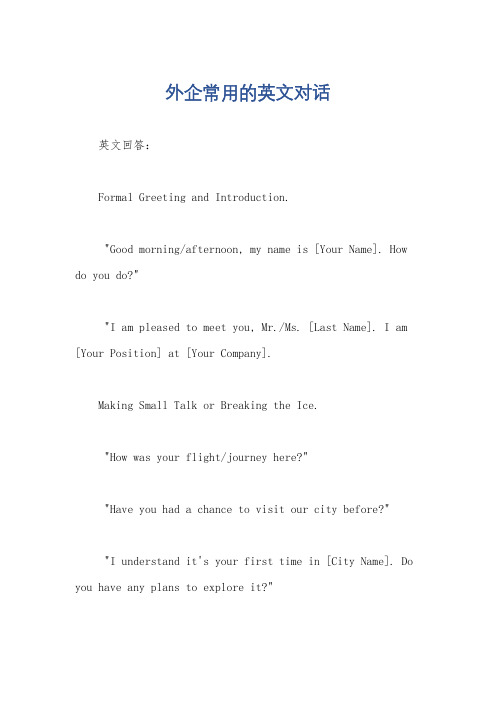
外企常用的英文对话英文回答:Formal Greeting and Introduction."Good morning/afternoon, my name is [Your Name]. How do you do?""I am pleased to meet you, Mr./Ms. [Last Name]. I am [Your Position] at [Your Company].Making Small Talk or Breaking the Ice."How was your flight/journey here?""Have you had a chance to visit our city before?""I understand it's your first time in [City Name]. Do you have any plans to explore it?"Discussing Business."I would like to discuss the details of our proposed partnership.""Could you please provide us with a breakdown of the project timeline?""We are interested in exploring the possibility of a joint venture."Negotiation and Resolution."We have a slight concern regarding the terms of the contract.""We would like to propose an alternative solution that we believe aligns with both our interests.""We are willing to compromise on certain aspects of the deal to reach a mutually acceptable outcome."Following Up and Closing."Thank you for your time today. I will send you a follow-up email with the details discussed.""We look forward to continuing our discussions and finding a way to collaborate effectively.""I appreciate your willingness to consider our proposal."Informal Communication."Nice to meet you. Let's get some coffee and chat.""Can you recommend a good restaurant nearby?""What are your favorite things to do in [City Name]?"中文回答:正式问候和介绍。
跟老外生意的日常用语
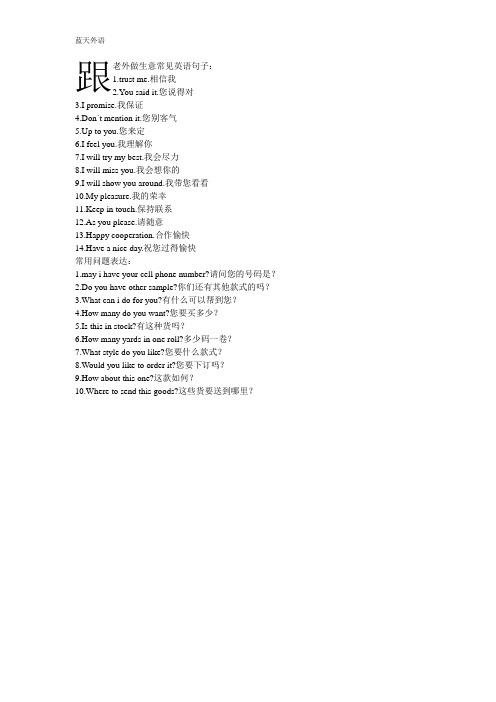
蓝天外语
跟
老外做生意常见英语句子:
1.trust me.相信我
2.You said it.您说得对
3.I promise.我保证
4.Don`t mention it.您别客气
5.Up to you.您来定
6.I feel you.我理解你
7.I will try my best.我会尽力
8.I will miss you.我会想你的
9.I will show you around.我带您看看
10.My pleasure.我的荣幸
11.Keep in touch.保持联系
12.As you please.请随意
13.Happy cooperation.合作愉快
14.Have a nice day.祝您过得愉快
常用问题表达:
1.may i have your cell phone number?请问您的号码是?
2.Do you have other sample?你们还有其他款式的吗?
3.What can i do for you?有什么可以帮到您?
4.How many do you want?您要买多少?
5.Is this in stock?有这种货吗?
6.How many yards in one roll?多少码一卷?
7.What style do you like?您要什么款式?
8.Would you like to order it?您要下订吗?
9.How about this one?这款如何?
10.Where to send this goods?这些货要送到哪里?。
外企常用英语口语句型
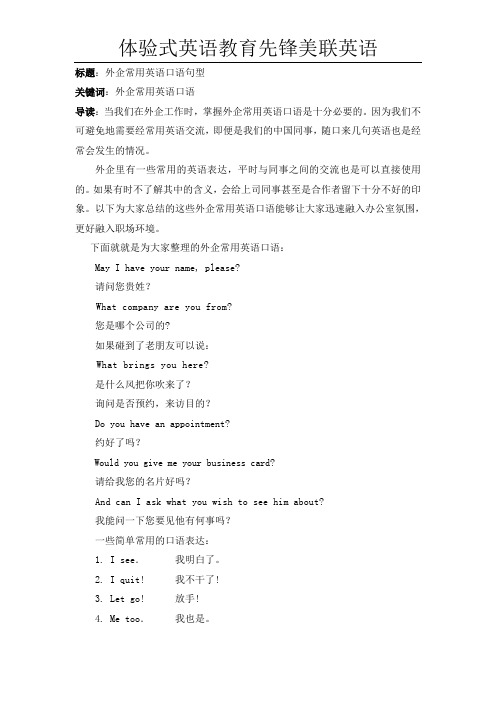
标题:外企常用英语口语句型关键词:外企常用英语口语导读:当我们在外企工作时,掌握外企常用英语口语是十分必要的。
因为我们不可避免地需要经常用英语交流,即便是我们的中国同事,随口来几句英语也是经常会发生的情况。
外企里有一些常用的英语表达,平时与同事之间的交流也是可以直接使用的。
如果有时不了解其中的含义,会给上司同事甚至是合作者留下十分不好的印象。
以下为大家总结的这些外企常用英语口语能够让大家迅速融入办公室氛围,更好融入职场环境。
下面就就是为大家整理的外企常用英语口语:May I have your name, please?请问您贵姓?What company are you from?您是哪个公司的?如果碰到了老朋友可以说:What brings you here?是什么风把你吹来了?询问是否预约,来访目的?Do you have an appointment?约好了吗?Would you give me your business card?请给我您的名片好吗?And can I ask what you wish to see him about?我能问一下您要见他有何事吗?一些简单常用的口语表达:1. I see.我明白了。
2. I quit! 我不干了!3. Let go! 放手!4. Me too.我也是。
5. My god! 天哪!6. No way! 不行!7. Hold on.等一等。
8. Not bad.还不错。
9. Not yet.还没。
10. See you.再见。
11. Shut up! 闭嘴!12. So long.再见。
13. Why not? 好呀! (为什么不呢?)以上就是我为大家整理的一些简单的外企常用英语口语。
大家在平时的工作和社交中可以广泛借鉴。
经常将这些简单口语挂在嘴边,练习的时间长了机会多了,就自然熟能生巧。
希望利用这些简单的的外企常用英语口语为大家的工作生活带来便利。
外企里最常用的15句英语表达
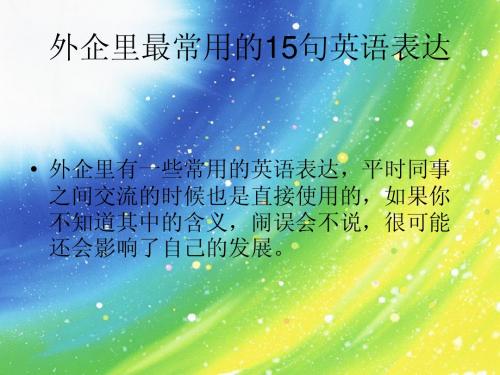
外企里有一些常用的英语表达,平时同事 之间交流的时候也是直接使用的,如果你 不知道其中的含义,闹误会不说,很可能 还会影响了自己的发展.
1,F. Y. I
刚进外企的时候,收到很多别人转过来的 信上都有这三个字Information.看到这几个 字母意味着下面内容和我有关,但是关系 不大,看看就好.因为对方如果要你采取 行动,一定会说清楚"Catherine, please……"而不会只是F.Y.I了事. 潜台词:和你关系不大,给你随便看 看.
这句话的字面意思是:"我的理解是…", 往往是在你发表一个观点或看法时,对方 会说 "My understanding is …".这时候你 要注意喽:他不是想让你听听他的理解是 什么.而是想告诉你,你的理解有误,我 再给你解释一下. 潜台词:老兄,你的想法错了,我说 的这个才是正确答案呢.
5,Appreciate
6,Involve
字面翻译成"介入".一件事情,在外企 involve的老板越高层,事情就越复杂, Director(总监)要是involve了,那 Manager(经理)就开始紧张;VP(副总裁)要 是involve了,那整个部门相关人员都别想 有好日子过,得加班加得四脚朝天. 潜台词:大佬很生气,后果很严重.
�
7,Aggressive
字面翻译成"进攻性的",在外企里面意思含 糊,褒义的有"具有开拓精神的","有事业 心的",贬义的有"咄咄逼人的","喜欢没 头脑乱闯的","容易得罪别人的",反正意 思可褒可贬,看你自己琢磨. 如果说自己 "aggressive"的,潜台词是:我可不是那种混 日子的人,我是能干事的. 潜台词:一旦被别人说"very aggressive",需要好好理解,也许人家是说: 这人整天凶巴巴的,不好相处,做事没头没脑, 老闯祸.但老板说你不够"aggressive",那意 思则是你不够积极,工作需要更主动些.
- 1、下载文档前请自行甄别文档内容的完整性,平台不提供额外的编辑、内容补充、找答案等附加服务。
- 2、"仅部分预览"的文档,不可在线预览部分如存在完整性等问题,可反馈申请退款(可完整预览的文档不适用该条件!)。
- 3、如文档侵犯您的权益,请联系客服反馈,我们会尽快为您处理(人工客服工作时间:9:00-18:30)。
我与外教,十句外企常用英语1. In the middle of something?正在忙吗?我知道有许多许多的人, 对于某一种概念学会了一种说法之后, 从此就只会用这种说法. 例如‘你在忙吗?’这个句子, 很多人在初中起就知道要说, "Are you busy?" 讲到了来美国留学三年, 他还是只会说"Are you busy?". 其实有时候我们的眼界要放广一点, 对于同一个概念要有不同的变化. 就像是"Are you busy?" 这句话, 其实老美也很常用"In the middle of something?" , (但这句话比较接近于"Are you busy right now?" 是问人家‘现在’是不是正在忙? "Are you busy?" 的含意比较广, 也可指‘最近’忙不忙?) 大家不要小看这么小小的变化, 如果你除了"Are you busy?" 之外, 有时还懂得刻意去用"In the middle of something?" 我相信你的的英文说出来就会跟别人不一样. 举个例子吧, 办公室里想找人八卦, 又怕人家正在忙, 这时你就可以问他, "In the middle of something?" (正在忙吗?)记得在不久之前看过的一部黑人电影Down to Earth 中也有in the middle of something 这个用法, 只不过男主角是用这句话来提出一个论点, "The first kiss is always in the middle of something." 也就是说, 初吻总是发生在讲话讲到一半时, 或是当你们正在作其它的事情时, 通常是果不其然的. 他同时也觉得, "The first kiss is the only real kiss in your relationship." (只有初吻才是真正的吻), "The others are just protocols" (其它的都只是一种敷衍、虚应故事而已.)2. What are you up to?你正在作什么?上面的例子一样, ‘你正在作什么啊?’这句话通常我们就只会说, "What are you doing?" 这样子不会很无聊吗? 其实有时我们可以换句话说. 例如: "What are you up to?" 同样也是问人家你正在作什么. 承上例, 假设你在办公室里, 你想找人八卦, 所以问同事, "In the middle of something?" 他回答, "Kind of." (算是吧.) 这时你就可以打破砂锅问到底, "What are you up to?" (那你最近在忙什么啊?) 另外有时候老美见面时也会问"What are you upto?" 意思就是问你最近在作什么啊? 跟另一句问候语"What's up?" 意思上很接近. 但是你要听对方的语气喔! 有时候"What are you up to?" 指的虽然还是"What are you doing?" 但它却是‘你在搞什么鬼啊?’的意思喔! 例如当你看到别人在乱翻你的东西, 你就可以责问他, "Hey, what are you up to?" 也就是骂他‘你在搞什么鬼啊?’. 或是像电影Blow 里毒贩的老爸骂他的儿子, "I know what you are up to." (我知道你在干些什么勾当.) 以上这些例子里, "What are you up to?" 完全可以用"What are you doing?" 来取代, 只不过因为我们在说话时要力求变化, 所以要多学几种不同的讲法.其实"What are you up to?" 还有许多其它的意思, 在此不一一列举, 不过还有一个比较常用的解释是, ‘进展的如何了?’例如朋友告诉你他正在写一部武侠小说, (就像我的labmate 一样), 你就可以问他, "What are you up to?" (进展的如何了), 而他的回答可能是, "I am writing Chapter 3 now." 我现在正在写第三章呢.3. Can you just give me a ballpark figure?能不能给我一个大概的数字.Ballpark 指的是专供球类比赛的公园, 特别是指大型的棒球场. 例如亚特兰大勇士队(Atlanta Braves) 的主场, Turner Field 就是一个ballpark. 那什么是ballpark figure 呢? 通常在棒球比赛时不是都会报今天的观众人数, 例如是49,132 人吗? 这个数字49,132 就是ballpark figure, 但这只是一个大约的估计数字而已, 所以ballpark figure 的意思就是指大约的估计数字. 所以在公司里如果老板问会计, 上个月水电费总共多少钱? 之后再加上一句, "Just give me a ballpark figure." 意思就是我只要一个大略的数字就行了. 甚至有些老美懒到就只说ballpark, 所以老板也有可能会说, "I'll need a ballpark of the revenue last year." (我需要去年的营收的大约数字.) 你就要自己知道这个ballpark 是ballpark figure 的意思.其实很多像ballpark 这种有点俚语的讲法, 你去问美国人, 我保证他们百分之九十九点九都知道ballpark 的意思. 但是有很多外国人, 不管他们的英语再流利, 不管在美国住多久, 却还是常常会有听不懂的状况. 像小笨霖的指导教授是欧洲人, 但在美国也待超过十年了, 英语的流利自然是不在话下. 可是呢? 有一次我跟她说"I can only give you a ballpark." 她却问我ballpark 是什么意思. 我讲这个小故事给各位听的原因, 就是告诉你们拿这种俚语去跟美国人交谈, 通常是没问题的, 但是如果去跟英语同样也很流利的老印, ABC, 或是在美国住了很久的外国人, 则不保证他们能听得懂.4. Bottom line: We have to turn into profit by 2002.最重要的是: 我们必须在2002 年前转亏为盈.大家看过财务报表没? 上面是一大堆密密麻麻的数字, 告诉你公司的资产有多少, 折旧多少, 应收帐款多少. 但是这些都不是最重要的, 最重要的在最最下面那一行(bottom line), 叫净赚(Net earnings) 告诉你这家公司总共加起来到底是赚钱还是赔钱, (这其实才是最重要的, 不是吗?) 所以bottom line 这个字后来就变成了有‘最重要的是...’的意思. 例如商场上有句名言, "In business, If you don't take care of your customers, somebody else will. And that is the bottom line." (如果你不关心你的顾客的话, 其它的人会, 这是最重要的原则. ) 另外bottom line 也有‘最后的底限’,‘不能再退让的原则’的意思. 例如老板可以告诫员工, "Bottom line: We have to ship this order by Friday." (我最后的底限是, 我们必须在星期五前运交这批货. )5. The new CFO was sent to bring the company out of the red.这位新的财务长被派来把公司从赤字中拯救出来.中国人喜欢红色, 所以股市大涨时盘面上都是红通通的一片. 不过欧美国家对红色的认知则大不相同, 红色就表示亏损, 赤字. 像之前提到的bottom line 如果是用红笔写的, 那就是表示公司整体上来说是赔钱的. 相反的如果是用黑笔写的, 则表示是赚钱的. 所以我们常可以听到in the red 或是in the black 这样的讲法, 其实就是指公司赚不赚钱. 当然啦, 我们也可以用最简单的讲法, lose money 和make money 或是形容词unprofitable 和profitable来表示赔钱或赚钱. 例如这家公司是赚钱的, 你可以说, "This company is in the black.", "The comapny is making money." 或是"The company is profitable." 都可以.讲到这个profitable 让我不得不提醒大家non-profit 这个字, 因为常常有人会搞错. Non-profit 这个字指的并不是说不赚钱的, 而是说‘非营利性质的’, 例如像消费者文教基金会我们就可以说他是一个non-profit organization, 非营利机构, 这种组织就不是以赚钱为目的. 但nonprofitable 的话则是指不赚钱的就等于unprofitable 或是non-profit-making.6. Shelly just called in sick.Shelly 刚打电话来请病假.Call in sick 是一个在办公室内常会用到的片语, 指的是有人打电话来说他生病了不能来上班. 有兴趣听老美讲这句话的人不妨去看"What Women Want?" (男人百分百) 这部电影, 我记得他们就有用"call in sick" 这个片语. 当然啦, 这种事想也知道一定有相当的比例是偷懒而不想来上班而已, 不然就是员工找借口集体罢工, 例如"Some workers called in sick to have a strike." (有些工人藉由集体打电话请病假来罢工.)那如果是正常的请病假(sick leave/ medical leave) 要怎么讲? 你可以说, "I need a sick leave for two days." (我需要请两天病假.) 或是如果是因为老婆要分娩了, 想要请事假(personal leave), 你可以说, "I'm asking for a three-day paid/unpaid personal leave for my wife's labor." (因为我老婆要生了, 我想要请三天假.) 至于这个假是扣不扣钱? (paid/unpaid) 就看公司的政策而定了.7. I just heard that seven people are going be laid off next month.我刚听到公司下个月要裁七位员工.最近失业率不断上升, 我也就顺便来谈谈裁员的话题. 公司要裁员的讲法有许多种, 其中最常见的不外是layoff 这个字(如果分开来写: lay off 是动词, 但合起来写layoff 则是名词) . 例如, "Cisco issues a profit warning, plans layoffs." (思科发布盈余警讯, 计划裁员.) 当然还可以用比较口语的讲法说, cut jobs 或是slash jobs, 例如上一句我们也可以说, "Cisco plans to cut/slash jobs." (思科计划裁员.) 据路边马路消息说, 由于layoff 最近在英语中的出现频率排名大幅成长, layoff 这个字将会被收录在最新的英文常用3000 字汇当中. ^__^要是真的不幸在美国被裁员了怎么办? 先记住两句话再说, 第一句是, "Whose decision was this?" (这是谁的决定.) 俗语说冤有头债有主, 先问清楚了是谁动你的, 将来要把汽车轮胎放气才知道要放哪一台. 另一句话就是, "I am between jobs." 这句话在找新工作时很好用. 人家问你现在在作什么, 你不要呆呆地说, "I just got laid off." 多难听啊! 你应该说, "I am between jobs." 我正好在两个工作间的空档. 听起来比较委婉这可是之前刚被裁了员的好友Joseph 教我的, 他就因为很会讲这句"I am between jobs." 目前已经在德州休士顿找到新工作了. :D8. He suggested we should go to eat after my graveyard shift.他建议说我们可以在我的大夜班之后一起去吃东西.轮班这个字在英文里叫shift, 例如三班制就叫three shifts. 例如, "We have to work in three shifts to keep the company running." (我们必须轮三班制来保持工厂的运转.) 我想大家都知道三班制就是日夜, 小夜班和大夜班. 在英文里日班就是day shift 或是regular shift, 小夜班是night shift. 那大夜班呢? 有一个很有趣的讲法, 叫graveyard shift. 所以如果你要说明自己上的是大夜班, 就可以这样说, "I work on the graveyard shift."至于为什么叫graveyard shift 呢? 其中有一个广为流传的故事是这么说的, 在十九世纪时, 人们有时候会不小心把还活着的人当成死人埋掉. 为了避免这种悲剧发生, 所以他们在每个棺材里都装上电铃, 以便让这些意外醒来的‘尸体’能够按铃求救. 也因此必须另外安排一位仁兄晚上时在墓地(graveyard) 里巡查, 以便有人按铃时能即时通知家属. 所以大夜班后来就以此得名, 成为了graveyard shift. 至于你相不相信这种传说呢? 就看你自己了!9. I am only a regular 9-to-5er.我只是一个平凡的朝九晚五上班族.我相信中文的‘朝九晚五’这个字应该就是从英文9-to-5 这个字直接翻过来的吧? 由于上班族的工作时间多半都是很固定从早上九点到晚上五点, 所以才有9-to-5 这个用法, 指的就是很一般上下班的工作. 记得有一次跟一个在社会上己经工作多年又回来念研究所的老美聊到他回学校念书的动机, 他就告诉我, "I don't want to work 9 to 5 for the rest of my life." (我不想一辈子都作朝九晚五的工作.) 另外像这种上班族也可以自称是一个9-to-5er, 也就是指作这种朝九晚五工作的上班族. 但是像小笨霖我呢? 我就该自称是10-to-3er 了. (我当然没那么认真凌晨三点回家, 而是下午三点就回家睡午觉了!)10. I refuse to work overtime during the weekend.我拒绝在周末时加班.英文里加班叫work overtime. 例如别人喊你今晚出去吃饭, 你说, "Sorry, I have to work overtime." 就是告诉他, 很抱歉, 我今晚要加班. 不过有趣的是, 除了‘加班’可以叫overtime, 加班费也可以叫overtime. 例如你可以大声地告诉老板, "You have to pay me overtime!" (你必须要付我加班费.) 不过现在时机不好, 我看还是小声讲就好了.除了这个pay overtime 之外, 老美也常用到另外两个字, 一个叫double time, 另一个叫time and one-half. Double time 指的是双倍的工资, 而time and one-half 或是time and a half 则是指一倍半的工资. 例如老板叫你作一些额外的工作, 你可以说, "If you pay me double time, I'll do it." (如果你付我双倍的工资, 我就去做.) 再造一句, "I like to work on holidays because I am on time and a half." (我喜欢在假日时工作, 因为这时的工资算一倍半.)The basket was heavy and the bundle was large, but she lugged them along like a person who did not find her especial burden in material things. Occasionally she stopped to rest in a mechanical way by some gate or post; and then, giving the baggage another hitch upon her full round arm, went steadily on again.It was a Sunday morning in late October, about four months after Tess Durbeyfield's arrival at Trantridge, and some few weeks subsequent to the night ride in The Chase. The time was not long past daybreak, and the yellow luminosity upon the horizon behind her back lighted the ridge towards which her face was set——the barrier of the vale wherein she had of late been a stranger——which she would have to climb over to reach her birthplace. The ascent was gradual on this side, and the soil and scenery differed much from those within Blackmore Vale. Even the character and accent of the two peoples had shades of difference,despite the amalgamating effects of a roundabout railway; so that, though less than twenty miles from the place of her sojourn at Trantridge, her native village had seemed a far-away spot. The field-folk shut in there traded northward and westward, travelled, courted, and married northward and westward, thought northward and westward; those on this side mainly directed their energies and attention to the east and south.The incline was the same down which d'Urberville had driven her so wildly on that day in June. Tess went up the remainder of its length without stopping,and on reaching the edge of the escarpment gazed over the familiar green world beyond, now half-veiled in mist. It was always beautiful from here; it was terribly beautiful to Tess today, for since her eyes last fell upon it she had learnt that the serpent hisses where the sweet birds sing, and her views oflife had been totally changed for her by the lesson. Verily another girl than the simple one she had been at home was she who, bowed by thought, stood still here, and turned to look behind her. She could not bear to look forward into the Vale.Ascending by the long white road that Tess herself had just laboured up, she saw a two-wheeled vehicle, beside which walked a man, who held up his hand to attract her attention.She obeyed the signal to wait for him with unspeculative repose, and in a few minutes man and horse stopped beside her."Why did you slip away by stealth like this?" said d'Urberville, with upbraiding breathlessness; "on a Sunday morning, too, when people were all in bed! I only discovered it by accident, and I have been driving like the deuce to overtake you. Just look at the mare. Why go off like this? You know that nobody wished to hinder your going. And how unnecessary it has been for you to toil along on foot, and encumber yourself with this heavy load! I have followed like a madman, simply to drive you the rest of the distance, if you won't come back.""I shan't come back," said she."I thought you wouldn't——I said so! Well, then, put up your basket,and let me help you on."She listlessly placed her basket and bundle within the dog-cart, and stepped up, and they sat side by side. She had no fear of him now, and in the cause of her confidence her sorrow lay.D'Urberville mechanically lit a cigar, and the journey was continued with broken unemotional conversation on the commonplace objects by the wayside. He had quite forgotten his struggle to kiss her when, in the early summer,they had driven in the opposite direction along the same road. But she had not,and she sat now, like a puppet, replying to his remarks in monosyllables. After some miles they came in view of the clump of trees beyond which the village of Marlott stood. It was only then that her still face showed the least emotion,a tear or two beginning to trickle down.。
